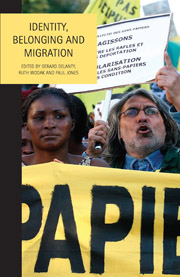Book contents
- Frontmatter
- Contents
- Acknowledgements
- List of Figures
- Notes on Contributors
- Introduction: Migration, Discrimination and Belonging in Europe
- I Theoretical Perspectives on Belonging
- II Institutional Forms of Discrimination
- III Cases of Belonging and Exclusion
- Conclusion: Discrimination as a Modern European Legacy
- Index
Conclusion: Discrimination as a Modern European Legacy
- Frontmatter
- Contents
- Acknowledgements
- List of Figures
- Notes on Contributors
- Introduction: Migration, Discrimination and Belonging in Europe
- I Theoretical Perspectives on Belonging
- II Institutional Forms of Discrimination
- III Cases of Belonging and Exclusion
- Conclusion: Discrimination as a Modern European Legacy
- Index
Summary
The classical work of Gunnar Myrdal, An American Dilemma (1944), was used in the USA to frame racist discrimination against blacks. According to Myrdal, prior to the civil rights movement there existed a huge discrepancy between the American creed of equal values and rights for all and the reality of racism and apartheid against blacks in American society. Myrdal pleaded for a way out of the ‘dilemma’, namely through the abolition of ‘race-laws’ and apartheid in the USA. At the time the ‘American dilemma’ was seen as an exception, with European racism and discrimination not receiving as much attention. However, Europe is also haunted by a dilemma. The fact is that racism and discrimination have been inseparable parts of European history and modernity. Jesse Taylor's (1999) typology identifies three interrelated properties – otherism, racism and narcissism – and suggests that European modernity needed ‘inferior others’ to legitimize its colonial wars, occupations, slavery and genocide. This resulted in racisms and discrimination towards ‘the others’ during the long history of the establishment and expansion of European civilization. Such an inferiorization of ‘others’ as inferior cultures also had the effect of developing a sense of narcissism among European nation-states and colonial powers.
Paradoxically, ideas of equal rights, universalism, humanism, and democracy were also a part of modern European history; but the fact remains that these Enlightenment ideals were not extended to the ‘others’.
- Type
- Chapter
- Information
- Identity, Belonging and Migration , pp. 301 - 310Publisher: Liverpool University PressPrint publication year: 2011
- 1
- Cited by

